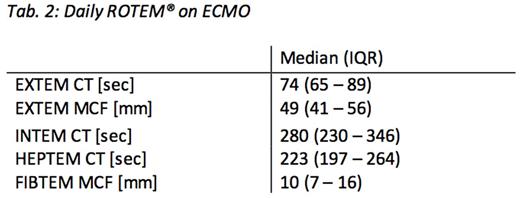Abstract
Background
Published data about bleeding management on extracorporeal membrane oxygenation (ECMO) in children is sparse and to date no global transfusion algorithm has been established. Viscoelastic testing can be effective for determining the etiology and management of coagulopathic bleeding during cardiothoracic procedures, but data regarding its usefulness in ECMO patients are scarce. Recently, low factor XIII levels were determined to be a frequent finding in adult ECMO patients(Kalbhenn et al; Perfusion 2015;30:675-82).
Methods
This is a retrospective analysis of thromboelastometry (ROTEM®) and factor XIII data obtained in children (ages 0 to 18 years) undergoing ECMO since 2013 in a single center children's hospital. Acute bleeding treatment was based on daily ROTEM testing, complete blood count and routine plasmatic coagulation testing. The transfusion algorithm targeted a hemoglobin level >13g dL-1, a Quick's value >50%, a plasma fibrinogen level >1.5g L-1, and a platelet count of >100,000 µL-1. Red blood cells (RBC), solvent detergent (S/D) plasma and platelet apheresis concentrates were exclusively used to maintain hemostasis. Measurement of FXIII levels is not part of routine testing, but was assessed when unexplained bleeding was observed.
Results
Laboratory and transfusion data from sixteen patients, age 4 (1-15) months [median(IQR)] with a body weight of 6 (3-8) kg were included. Median time on ECMO was 7 (4-9) days. Large volumes of allogeneic blood were transfused to all children, meeting criteria for massive transfusion each individual day on ECMO (Tab.1). Overall, median daily ROTEM measurements were within reference ranges (Tab.2), while median levels of FXIII were decreased despite massive transfusion [FXIII levels 42% (28-51%)].
Conclusion
Pediatric ECMO was almost always combined with daily massive transfusion, which led to correction of overall ROTEM values. Notably, despite transfusion of large amounts of plasma, decreased FXIII levels were noted. This finding is supported by results of a study in adult ECMO patients, where FXIII levels <50% were observed in 88% of all patients. Although inherited homozygous FXIII deficiency is usually defined by levels <5%, even mildly to moderately reduced FXIII levels have been reported to contribute to increased bleeding after cardiac surgery(Ternström et al; Thromb Res 2010;126:e128-33). Further studies should be performed to assess the impact of FXIII substitution in pediatric ECMO patients and to investigate whether substitution of FXIII may decrease bleeding without increasing thrombotic complications.
Haas:CSL Behring: Speakers Bureau; TEM International: Speakers Bureau; Octapharma: Consultancy.
Author notes
Asterisk with author names denotes non-ASH members.



This feature is available to Subscribers Only
Sign In or Create an Account Close Modal